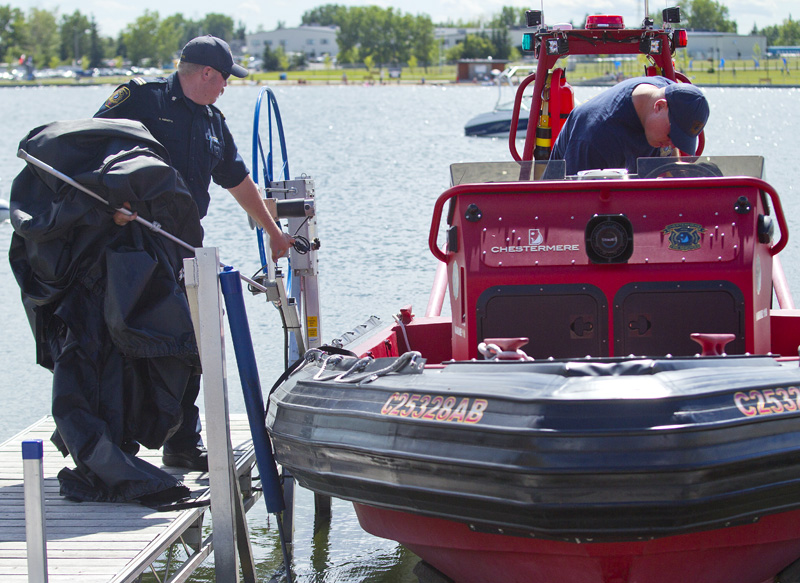
Chestermere Fire Services (CFS) have teamed up with municipal enforcement to ensure lake users are safely enjoying the water this summer.
“We’re assisting the Chestermere Peace Officers with their enforcement role, and doing more of a safety component on that,” said CFS Capt. Brent Paquette.
After joining forces last year, Chestermere Peace Officers now regularly Patrol the lake while on CFS vessels.
Along with patrolling with CFS, the Chestermere Peace Officers have undergone much of the same water rescue training that CFS has.
“Rescue wise, and getting somebody out of the water, the peace officers have been training with us,” Paquette said.
Teaming up with municipal enforcement was a simple decision because if CHS is out on another call, the peace officers can begin to help in an emergency situation.
“If they are already out on the boat, without fire services, they need to be able to start dealing with the emergency before we arrive,” Paquette said.
“It’s always good to work and collaborate with the other agencies, we work very well together. It’s been definitely a bonus, while they’re doing their enforcement part, we’re doing the safety part,” he said.
He added, having the agencies together is financially responsible for the taxpayers.
CFS is actively ensuring everyone on motorized, and non-motorized vessels have life jackets that fit correctly and are reminding boaters to make sure all of their equipment is functioning correctly while out on the lake.
Although lake users are encouraged to bring all necessary safety equipment with them, they are also reminded to look at the weather prior to going out on the lake.
Many lake users do not watch the sky, or notice storm clouds rolling in, which can result in them getting stuck on the lake, Paquette said.
“A lot of people seem to get caught out there when bad weather suddenly creeps in,” he said.
Boaters are also reminded to put their navigation lights on and leave them on during the evenings or when there is poor weather, he said.
Adding, “Navigation lights help us see vessels while we’re out there.”
Motorized vessel operators should know what their craft is capable of, if the wind or poor weather occurs, and what areas of the lake to avoid.
“People think it’s a fairly small lake, so it’s not going to be a big issue but when the wind comes up, it becomes a very large issue,” Paquette said.
He also encourages non-motorized lake users to know their abilities, be aware of how far from their launch point they are at all times, have a plan, and tell someone where they are going.
“We’ve had that where somebody disappeared, and they don’t know where they are out there on the lake, then we’re searching for them,” Paquette said.
He added, “Our biggest challenges are during emergency response; a lot of people don’t necessarily know where they are on the lake.”
To make finding persons on the lake easier, the Chestermere Lakefront Owners Association encouraged homeowners to place standardized, reflective address signs on their docks.
“Overall, over 120 lakefront owners jumped on board with the Chestermere Lakefront Owner’s Association, and purchased signs themselves to put on their docks,” Paquette said.
“Knowing the approximate address for where a person is definitely cuts down on our response time,” he said.
Adding, when people are in emergency situations and call 9-1-1, they don’t know where they are on the lake.
Although finding lake users on the lake can be challenging, CFS is trained to remember landmarks and know each block from the water.
“If someone says they are close to a lighthouse in a back yard, that narrows it down to three spots for us,” Paquette said.
“The average boater out there doesn’t know where they are, but if they can look at one of the signs that’s out on a dock, and give us an address we’ll know right away,” he said.
Whenever CFS is out on an emergency call with the lights and sirens, they are asking for the right-of-way, no different than on a roadway.
“It doesn’t mean the second we go by that you follow us either,” Paquette said.
“People are curious they want to know what’s going on, and they follow us, but the wakes that those boats give off is an issue for us,” he said.
“Keep those areas clear, if they see us out there working, try to make it a no-wake zone around us. It definitely makes our lives much easier,” he added.
Currently, CFS has been busy patrolling the water and ensuring all lake users are having fun safely.
“We’ve been fairly busy so far, but nothing major,” Paquette added. “We’ve been out there for a few things, including sinking boats.”
CFS should always be called to help with any sinking boats, whether the vessel is in the middle of the lake, or by a dock.
“There are other things we need to worry about when we have boats that have taken on water,” Paquette said.
“We need to worry about fuels and oils getting into lake, and we need to deal with the hazardous materials,” he said.
CFS will get the boat properly out of the water, and deal with the petroleum products coming out of the vessel with absorbent pads.
Although it has been a busy year patrolling the water, municipal enforcement and CFS have received an overwhelming amount of compliance and willingness from lake users.
“Everyone is more than happy to try to fix or correct whatever issues they have immediately,” Paquette said.
“That’s been a very good, and very positive thing,” he said.
Adding, “We’re on the same line with the peace officers. We will give a huge amount of respect to every single person out there, and we expect the same in return.
“We’re there to help. We’re not there to hinder anyone’s day. We’re completely there to help.”









